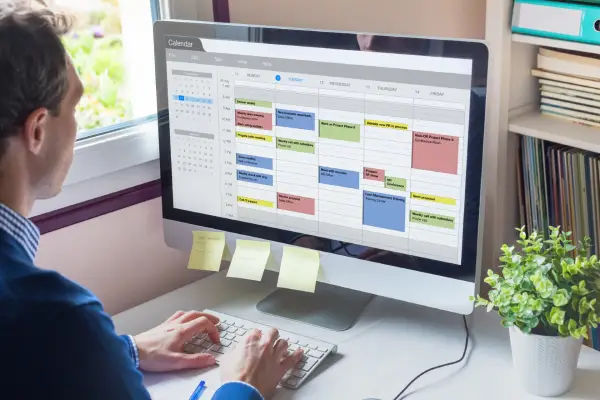Many people with multiple sclerosis retire from work early after the diagnosis of the disease. What are the cognitive barriers that make it difficult to stay in the workplace, and what can be done to deal with them? Second article in the series.
The previous article presented the physical and emotional barriers that make it difficult to stay in the world of work, and solutions to deal with these barriers. This article will present the cognitive barriers that make it difficult to function optimally in the world of work, and often lead to the decision to leave the workplace early. Cognitive difficulties are one of the significant problems affecting people with multiple sclerosis in the world of work. Studies have found that 43-70% of people with multiple sclerosis experience cognitive difficulties. 1 Cognitive deficits largely contribute to the low employment rate among people with MS. People with MS who report cognitive changes are four times more likely to be out of the workforce than the general population. 2
Video: “Rehabilitation of the patients with Multiple Sclerosis”
Multiple Sclerosis. Exercises for stretching and improving body flexibility and joint mobility, reducing tone.
For additional information about Rehabilitation of the patients with Multiple Sclerosis you can watch a video demonstrating exercises and rehabilitation recommendations.
Memory deficits
Memory deficits constitute the most significant cognitive difficulty and a barrier to staying at work.
Deficits of speed and efficiency of information processing
Two other cognitive deficits that people with multiple sclerosis complain about are in the areas of information processing (speed and efficiency of processing), concentration, problem solving, drawing conclusions, and mental flexibility. The severity of the cognitive difficulties varies from person to person, depending on the type of disease and its progression. 1
The cognitive difficulties at work not only make the work itself, and the work products, more difficult, but also raise anxiety and can damage the self-ability to work optimally. 3 In addition, the physical and emotional difficulties presented in the previous article, primarily fatigue, may lead to less good cognitive performance, which in turn may contribute to making more mistakes while working.
improvement in your work habits
What can be done while working to deal with the cognitive difficulties? 2,3
First and foremost, you should make an improvement in your work habits today or tomorrow:

Planning in advance :
It is useful to plan the work week at the beginning of each week, and it is even more important to plan the work day at the beginning of each day. This planning will include putting in writing all the tasks that must be performed on the particular work day, including tasks that have not yet been completed, and with the possibility of adding additional tasks to the list during the day. The planning will take into account the duration of the various tasks, and the physical condition (fatigue, pain, etc.) correct for that day. You can prepare another list of tasks that need to be completed later if their completion is not possible on the same day. After a to-do list has been compiled, it is useful to prioritize the execution of the various tasks from the most important and urgent to the least important. It is recommended to carry out important and urgent tasks at the beginning of the day, when you feel fresher, and leave easier tasks for the end of the day. organization: Getting organized before starting a task can be very beneficial to its success. You can use self-questioning: Is the purpose of the task clear? Are all the materials to complete the task at hand? Is there enough time to complete the task right now? It is advisable to organize all the materials and aids in advance and only then start performing the task.
Documentation :
It is recommended to keep a record of which tasks were performed, how they were performed, and what the result was. For example, it is possible to document the performance of a certain process at work, and thus it will be possible to return to the documentation the next time it is necessary to perform the same process, without wasting time and energy on rethinking. After a meeting with a co-worker, you can document what was agreed and what needs to be done until the next meeting. If you take a break during work, it is advisable to document what has already been done and what remains, so that you can continue from the exact same place after the break.
Dividing tasks into smaller tasks :
for optimal success in performing complex tasks, which include several steps, it is useful to divide them into smaller tasks and make sure to complete each of the small tasks to the end. Between doing one task and another, you can take a break, and come back more focused and refreshed.
Reducing distractions :
Before performing tasks that require a lot of attention, it is useful to prepare the work environment and reduce distractions that may make the performance difficult. For example, you should arrange the desk, turn on a suitable light above the workstation, raise a curtain if there are many distractions outside, and silence the phone. In addition, you should choose times when the workplace is quieter, or a time when fewer people are around. You can even make a small sign asking not to be disturbed during this time.
self-listen and self-control ability
After building a set of work habits that help concentration, and to remember details easily, it is very important to develop the ability to self-listen and self-control. That is, to develop awareness of personal performance and abilities at a given time. It is recommended to be more aware of personal abilities and understand that cognitive abilities change from time to time, and become less good during times of anxiety or fatigue. This way you can avoid performing important or more difficult tasks at times when cognitive function is not at its best. On the other hand, it is possible to choose better times, when concentration and attention are better, to perform complex tasks.
You should make sure to properly manage your time during the day, and take breaks. It is important to develop self-listening skills and notice when mistakes are made or when attention is lost. The breaks can be regular – for example a break for lunch, or depending on the abilities at that moment. Many times in a state of fatigue and difficulty concentrating, it is useful to take a proactive break and continue working more refreshed. Taking a break is not a waste of time and can help you complete tasks with fewer mistakes and faster. It is recommended not to start a task at times when it is felt that the cognitive abilities are not at their peak, in order not to risk making multiple mistakes.
use external aids
Beyond referring to self-functioning, you can also use external aids that can make it easier to do the work, and prevent making mistakes. These aids can be simple such as a meeting diary or a task notebook, and can be more advanced – such as applications for task lists, an electronic diary, reminders and alarm clocks that can be set in advance, etc.

help of co-workers and direct managers
Another way to deal with cognitive difficulties at work is to use co-workers and direct managers . Contrary to the typical behavior of trying to hide the difficulties, in the hope that maybe no one will notice, it is better to share the difficulties and their consequences on the work itself with the co-workers and direct managers. This sharing will help reduce anxiety around the topic, and can be very beneficial to the work itself. It is possible to work together with a co-worker, so that he can perform additional control over our work, and identify mistakes while making them. It is also possible to schedule more frequent work meetings with the direct manager, so that it is possible to conduct a joint control of the work products, receive feedback for further improvement, and discuss problems that may arise due to the cognitive difficulties. It is also possible to receive professional guidance from a professional in the same field, who can help to optimize the way we work.
Conclusion
In conclusion, cognitive difficulties at work are one of the biggest challenges affecting people with MS, and their ability to remain in the world of work. As presented in this article, there are quite a few ways to ease the cognitive difficulties at work. You should try and deal with these difficulties, before you throw up your hands and decide to retire from work.
The author: Dr. Noa Givon Shaham, PhD, an occupational therapist specializing in geriatrics
Sources:
- Chiaravalloti & DeLuca J. Lancet Neurol 2008; 7:1139-51.
- Bishop & Rumrill. Work, 2015; 52:725-734
- Jelle et al. Disability Rehabilitation, 2014; 36:1594-1599

Check out the demo version of our sets of exercises for Multiple Sclerosis on YouTube
You can find more information about Multiple Sclerosis in our Library of Articles.
Our website presents the following sets of exercises for the rehabilitation of the patients with Multiple Sclerosis:



